Frequently Asked Questions
Frequently Asked Questions are designed to assist you in choosing the correct hot water system for you needs
General
1. Electric Water Heaters
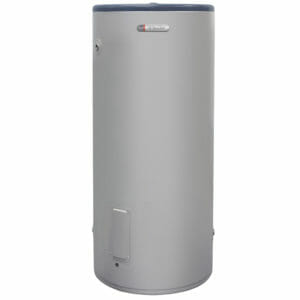
Operation:
- Storage Systems: Water is heated by an electric element at the bottom of the tank and stored in an insulated tank until needed.
- On-Demand Systems: The element is coiled around the pipes, heating the water as it flows through the system.
Advantages:
- Affordable upfront costs: Generally cheaper to buy and install.
- Reliable: Consistently supplies hot water.
- Off-peak heating: Some systems can be set to heat water during off-peak electricity periods, reducing energy expenses.
Disadvantages:
- High long-term costs: Typically more expensive to operate due to electricity prices.
- Environmental impact: Contributes to higher greenhouse gas emissions, particularly if powered by non-renewable energy sources.
- Less eco-friendly: Generally not considered a sustainable option.
2. Gas Water Heaters
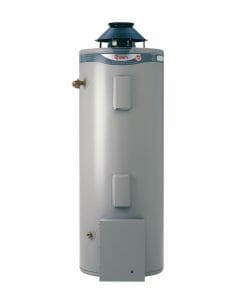
Operation:
- Storage Systems: A gas burner heats water in a storage tank, maintaining the temperature continuously.
- On-Demand Systems: The gas burner activates only when hot water is required, heating the water instantly.
Advantages:
- Lower emissions: Produces fewer greenhouse gases than electric systems.
- Cost-effective: Generally cheaper to run, especially with a connection to mains gas.
- Instant hot water: On-demand systems provide hot water immediately without the need for storage.
Disadvantages:
- Dependence on gas supply: Requires access to mains gas; using gas bottles can be less reliable and more costly.
- Installation requirements: Usually needs to be installed outdoors or requires proper ventilation if placed indoors.
3. Solar Water Heaters
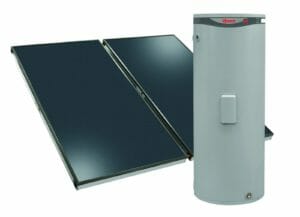
Operation:
- Solar panels capture sunlight, converting it into heat to warm the water stored in a tank.
Advantages:
- Energy savings: Can cut hot water energy use by up to 90%.
- Eco-friendly: The most environmentally friendly option, significantly reducing carbon emissions.
- Energy efficiency: Utilizes renewable solar energy, making it highly efficient.
Disadvantages:
- High initial cost: More expensive to purchase and install, with costs ranging from $2,000 to $7,000 after rebates.
- Weather-dependent: Less effective on cloudy days, though most systems include a backup heater (gas or electric) to ensure a consistent supply.
4. Heat Pump Water Heaters
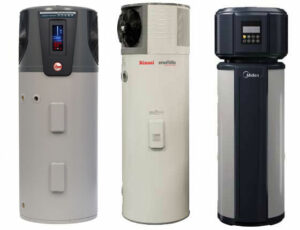
Operation:
- Heat pumps draw warm air from the environment and transfer the heat to water in the storage tank, functioning similarly to a refrigerator in reverse.
Advantages:
- Energy-efficient: Typically three times more efficient than traditional electric water heaters, despite using electricity.
- Cost savings: Lower operating costs in the long term due to higher efficiency.
Disadvantages:
- Climate considerations: Best suited for warm climates; less effective in colder areas, although some models come with boosters.
- Higher upfront cost: More expensive than standard electric heaters, but energy savings can offset this in suitable climates.
Installing your own hot water system is illegal in Australia… plus it’s very dangerous! The risks aren’t worth it – avoid serious harm (and voiding your warranty), and call a plumber, electrician or gas fitter to do it for you.
If you’ve chosen a system that attracts government rebates, like solar hot water or heat pump heaters, DIY will mean you can’t claim your money back.
Storage Hot Water Systems
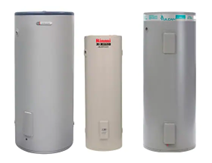
How It Works:
- Preheating: Water is heated in advance and stored in a large, insulated tank, ready for use whenever needed.
- Large Storage Tank: These systems typically require a sizable tank to hold the preheated water.
Advantages:
- Ready Supply: Hot water is immediately available since it’s preheated.
- Off-Peak Heating: Can be programmed to heat water during off-peak energy periods, which can reduce costs.
Disadvantages:
- Heat Loss: Even with insulation, stored water gradually loses heat, leading to energy inefficiency.
- Limited Supply: Once the hot water in the tank is used up, you have to wait for it to reheat before more is available.
Instantaneous (Tankless) Hot Water Systems
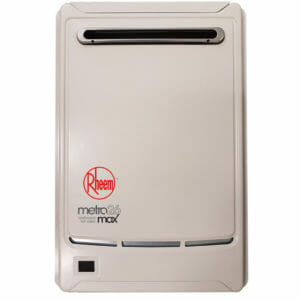
How It Works:
- On-Demand Heating: Water is heated only when you turn on the tap, so there’s no need for a storage tank.
- Compact Size: These systems are small and can be installed in tighter spaces.
Advantages:
- Energy Efficiency: Since water is only heated when needed, there’s no energy wasted on keeping water hot in a tank.
- Unlimited Hot Water: As long as the system meets demand, you won’t run out of hot water.
Disadvantages:
- Electricity Required: Even gas models need electricity to ignite the burner and manage controls.
- Flow Rate Requirement: There’s usually a minimum flow rate required to activate the heater, which can cause a slight delay in getting hot water to the tap.
The answer is different for different situations. It depends on your roof space, energy tariffs and access to natural gas.
Does your home have natural gas available? If so, gas-boosted solar, 5 Star gas storage or continuous flow may suit. If not, then perhaps an electric boosted solar heater or a Heat Pump might be the answer.
Do you have a low off-peak electricity tariff? If so, electric water heating on an off-peak tariff may have the lowest running cost.
Basically “Mains Pressure” means you will always have a water heater designed to provide a steady and strong flow of water at mains pressure to more than one tap at the same time.
Water heaters are not created equal and some units cannot offer this advantage because of the way they operate. An example of system that cannot supply “Mains Pressure” are ‘coil’ and ‘instant hot water system’ or ‘continuous flow’ because their water flow is restricted to allow an increase in water temperature as the water passes through the water heater.
A “Mains Pressure” water heater heats water and stores it so that it’s ready for you as soon as you need it. This ensures full pressure to showers, washing machines, dishwashers and baths – simultaneously
It’s important to consider this because everyone loves lots of hot water and no one likes their shower turning to a trickle when another tap is turned on!
The Meadowbrook warehouse is used for storage and repairing hot water systems. No Hot Water units are stored there. By appointment, orders can be collected from there, but in general it is not a walk in store.
In an effort to provide the lowest prices and the best service, the units are delivered directly from the supplier’s warehouse. Generally, the public is not allowed access to these premises because of safety concerns (Forklifts and B Doubles)
Yes, we offer fast and free delivery to most metropolitan areas throughout Australia. Larger items are delivered to site while items such as spare parts are delivered by Australia Post Express or Toll
Absolutely! Our friendly and knowledgeable staff can provide expert advice to help you choose the right hot water system based on your needs and budget. Give us a call today 1300 726 211.
We offer a variety of hot water systems, including electric storage, heat pump, gas storage, and continuous-flow hot water systems. Each type has its own advantages and is suited to different applications and needs. Call us for advice 1300 726 211
When hot water systems are described as energy-efficient, it means that they can heat water while consuming less energy compared to less efficient alternatives. In the context of Australia, where energy costs can be significant and there’s a growing emphasis on sustainability, energy efficiency is particularly important.
Here’s what it means in practical terms:
Reduced Energy Consumption: Energy-efficient hot water systems are designed to maximize the amount of heat generated per unit of energy consumed. This means they use less electricity, gas, or other fuel sources to heat the same amount of water compared to less efficient systems.
Lower Utility Bills: Because energy-efficient hot water systems use less energy, they result in lower utility bills for homeowners. This can lead to significant cost savings over time, especially considering that water heating typically accounts for a substantial portion of household energy usage.
Environmental Benefits: By consuming less energy, energy-efficient hot water systems help reduce the overall demand for electricity, gas, or other fossil fuels. This, in turn, leads to lower greenhouse gas emissions and environmental impact, contributing to efforts to combat climate change and promote sustainability.
Long-Term Savings: While energy-efficient hot water systems may have a higher upfront cost compared to less efficient options, they often provide significant long-term savings due to lower operating costs. Over the lifespan of the system, these savings can more than offset the initial investment, making energy-efficient systems a financially sound choice.
Government Incentives: In many cases, governments offer incentives, rebates, or subsidies to encourage the adoption of energy-efficient technologies, including hot water systems. These incentives can further reduce the cost of purchasing and installing energy-efficient systems, making them even more attractive to homeowners.
Overall, describing hot water systems as energy-efficient underscores their ability to provide reliable hot water while minimizing energy consumption, costs, and environmental impact—a win-win for homeowners and the planet alike.
Solar
A solar hot water booster refers to a component or system integrated with a solar hot water system to provide additional heating when sunlight is insufficient to meet hot water demands.
Solar hot water systems utilize sunlight to heat water stored in a tank or cylinder, typically mounted on the roof of a building. However, during periods of low sunlight or increased hot water usage, such as cloudy days or at night, the temperature of the water in the tank may drop below the desired level. To address this issue, a solar hot water booster comes into play.
The booster can be in the form of an electric or gas-powered heating element integrated into the water tank. When the water temperature from the solar panels is insufficient, the booster activates to heat the water to the desired temperature, ensuring a constant supply of hot water for household use. This ensures that even on days with limited sunlight or during peak usage times, residents can still enjoy hot water without interruption.
In essence, the solar hot water booster complements the primary solar heating system, providing a reliable backup to ensure consistent hot water supply throughout various weather conditions and usage patterns. This combination of solar power and supplementary heating contributes to energy efficiency and reduces reliance on non-renewable energy sources, aligning with Australia’s push towards sustainable living and reduced carbon emissions.
Heat pump
The Transformative Benefits of Heat Pump Hot Water Systems in Australia
In the realm of sustainable living and energy efficiency, one innovation stands out as a beacon of progress: the heat pump hot water system. In Australia, where the sun’s rays beat down relentlessly, harnessing this abundant energy source for heating water is not just a sensible choice; it’s a transformative one. Let’s delve into the myriad benefits that installing a heat pump hot water system brings to Australian households and the environment at large.
1. Energy Efficiency:
Heat pump hot water systems operate on the principle of extracting heat from the ambient air and transferring it into the water tank. This process consumes significantly less electricity compared to traditional electric water heaters. In fact, studies have shown that heat pump systems can be up to 70% more energy-efficient than conventional electric storage systems. By reducing energy consumption, households can slash their electricity bills while minimizing their carbon footprint.
2. Cost Savings:
With rising energy costs, Australian households are constantly seeking ways to trim their expenses. Heat pump hot water systems offer substantial long-term savings by drastically reducing electricity usage for water heating. While the initial investment may seem higher than traditional water heaters, the savings on energy bills quickly offset the upfront cost. Over the lifespan of the system, homeowners can enjoy substantial financial benefits, making it a savvy investment for the future.
3. Environmental Impact:
Australia’s commitment to sustainability is more critical than ever as we confront the challenges of climate change. By transitioning to heat pump hot water systems, households contribute to reducing greenhouse gas emissions and mitigating environmental degradation. Unlike gas or electric water heaters, heat pumps produce minimal emissions, making them a cleaner and greener alternative. By embracing this eco-friendly technology, Australians can play a vital role in building a more sustainable future for generations to come.
4. Reliability and Durability:
Heat pump hot water systems are designed to withstand the rigors of daily use while delivering consistent performance. Unlike solar water heaters, which depend on weather conditions, heat pumps operate efficiently regardless of the external environment. With proper maintenance, these systems can last upwards of 15 years, providing reliable hot water supply throughout their lifespan. This durability ensures peace of mind for homeowners, knowing that their investment will continue to serve them well for years to come.
5. Versatility:
One of the standout features of heat pump hot water systems is their versatility in installation. Whether you reside in a bustling city apartment or a sprawling suburban home, there’s a heat pump solution tailored to your needs. These systems come in various sizes and configurations, making them suitable for both residential and commercial applications. Furthermore, they can be installed indoors or outdoors, offering flexibility to suit your space constraints and preferences.
6. Quiet Operation:
Say goodbye to the noisy, clunky water heaters of yesteryears. Heat pump hot water systems operate quietly and efficiently, ensuring a peaceful environment within your home. Unlike traditional water heaters that produce disruptive noise during operation, heat pumps work silently in the background, allowing you to enjoy tranquility without any distractions. This silent efficiency enhances the overall comfort of your living space, creating a more pleasant home environment for you and your family.
7. Government Incentives:
To encourage the adoption of renewable energy technologies, various government incentives and rebates are available to homeowners who install heat pump hot water systems. These financial incentives can significantly offset the initial cost of purchase and installation, making the transition to a more sustainable energy solution even more appealing. By taking advantage of these incentives, homeowners not only reap the benefits of lower energy bills but also contribute to national efforts to combat climate change.
8. Future-Proof Investment:
As Australia continues its transition towards a low-carbon economy, investing in renewable energy technologies is not just a smart choice; it’s a necessity. Heat pump hot water systems represent a future-proof investment that aligns with the nation’s renewable energy goals. By embracing this technology today, homeowners position themselves at the forefront of the clean energy revolution, ensuring their homes are equipped for a sustainable tomorrow.
Conclusion:
In conclusion, the benefits of installing a heat pump hot water system in Australia are undeniable. From energy efficiency and cost savings to environmental stewardship and reliability, these innovative systems offer a multitude of advantages for homeowners and the planet alike. By making the switch to heat pump technology, Australians can enjoy hot water on demand while simultaneously reducing their carbon footprint and contributing to a more sustainable future. It’s time to embrace efficiency and transform the way we heat water in Australia.
Gas
The answer is different for different situations. It depends on your roof space, energy tariffs and access to natural gas.
Does your home have natural gas available? If so, gas-boosted solar, 5 Star gas storage or continuous flow may suit. If not, then perhaps an electric boosted solar heater or a Heat Pump might be the answer.
Do you have a low off-peak electricity tariff? If so, electric water heating on an off-peak tariff may have the lowest running cost.




